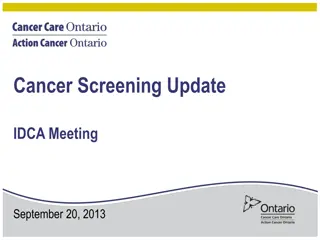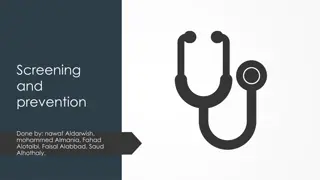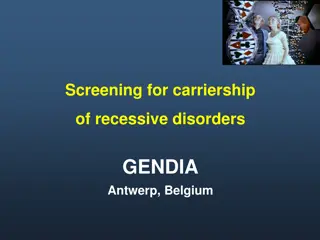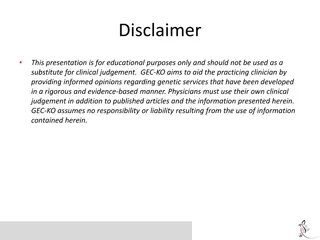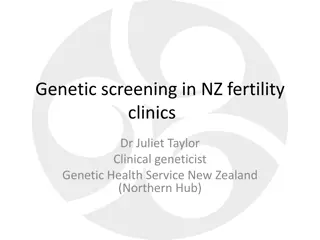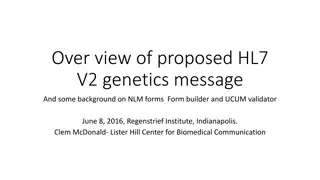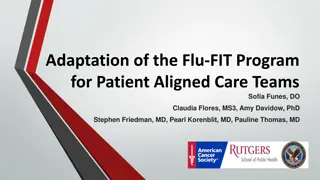Understanding Genetic Testing and Cancer Screening
Genetic testing involves the analysis of germline genes to determine the risk of developing certain cancers or passing on risks to offspring. It can provide valuable insights into cancer risks, help inform relatives about potential risks, but may have limitations and risks such as cost and insurance coverage issues. Results may vary from positive mutations to variants of unknown significance, impacting decisions on treatment and care. Insurance coverage for genetic testing and cancer screening also varies based on guidelines and laws, including provisions under the Affordable Care Act.
Download Presentation

Please find below an Image/Link to download the presentation.
The content on the website is provided AS IS for your information and personal use only. It may not be sold, licensed, or shared on other websites without obtaining consent from the author. Download presentation by click this link. If you encounter any issues during the download, it is possible that the publisher has removed the file from their server.
E N D
Presentation Transcript
Genetic Testing and Cancer Screening Cori Chandler, MPA Sr. Manager, State & Local Campaigns Access to Care
Genetic Testing What is it?The testing of a person s germline genes. This testing is typically performed using biospecimens such as blood or cells Why do it? Some families experience higher rates of cancer than others Risk based on personal or family history of cancer Informs cancer screening recommendations 3
Screening vs. Genetic testing vs. Biomarker testing Screening tests like MCED, mammograms Looking for signs of cancer in general population Genetic testing Testing for inherited risk to determine risk for developing certain cancers or passing risk onto children Biomarker testing Used in people who already have cancer to determine best treatment options, how aggressive the disease is, monitor for recurrence 4
Considerations of Genetic Testing Benefits: Better understanding of cancer risks Inform blood relatives of potential cancer risks Limitations: Testing can be expensive if not covered by insurance It does not always provide an answer about the cause of cancer within a family Risks: Life, long-term care and disability insurers are permitted to use genetic and health information to make coverage and premium decisions 6
Results Positive for a mutation, negative for a mutation, variant of unknown significance 7
Insurance Coverage Insurance Coverage for Genetic Testing Most health plans cover genetic counseling and testing for inherited gene mutations linked to cancer in people who meet the national guidelines. The cost of testing and your out-of-pocket charges may vary based on several factors. Insurance Coverage for Genetic Testing Insurance Coverage for Cancer Screening Varies based on cancer type, typically according to national guidelines Oftentimes states have laws that impact this coverage for state-regulated plans How does the Affordable Care Act come into play? Non-grandfathered private health insurance plans are required under the ACA to provide coverage of certain preventive services without cost sharing (according to USPSTF guidelines). Includes services that have an A or B recommendation rating from the USPSTF Lung cancer screening for certain adults B grade Colorectal cancer screening for 45-75 B grade Breast cancer screening for women aged 50-74 - B grade Genetic testing for BRCA B Grade 8
Goal of SB1264 Ensure access to genetic testing Allows those with a personal or family history access to genetic testing according to scientific and medical evidence Access to necessary follow-up Ensures individual has access to the appropriate follow up screening according to their risk Eliminates cost-sharing for genetic testing and cancer imaging in accordance with NCCN clinical praction 9
Questions? 10





